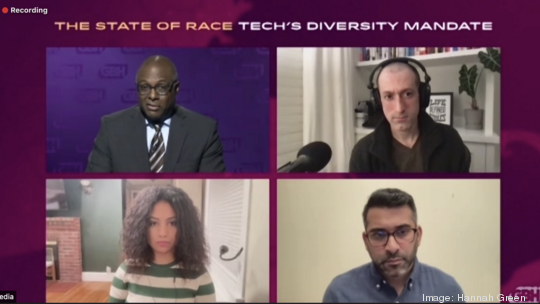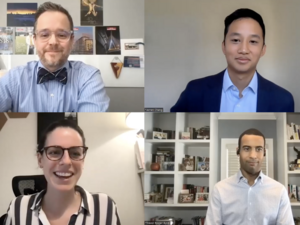
Following the social justice protests that spanned the nation in the summer of 2020, tech companies pledged to create a more equitable and diverse workplace. While some progress has been made, many in the industry believe the promises remain largely unfulfilled.
“We see this trend where something horrific happens in the Black community and then companies want to hop on the train of saying we want to diversify, we want to do better,” said Pariss Chandler, CEO and founder of the Black Tech Pipeline. “But they don’t really put processes or policies in place to really welcome Black people into their companies.”
Chandler shared her experience on a panel Thursday night hosted by the Greater Boston Chamber of Commerce, the Black Economic Council of Massachusetts, NAACP Boston Branch and GBH World. She spoke alongside David Delmar Sentíes, founder of Resilient Coders, and Pranshu Verma, technology reporter at The Boston Globe, about the work yet to be done in changing Boston’s tech industry.
The tech industry is one of the least diverse sectors of Massachusetts’ economy. A 2020 report from the Mass Technology Leadership Council showed that only 5% of tech workers in the state are Black, 7% are Latinx and 20% are Asian. Last year, a record $34.8 billion in venture capital went to startups in Massachusetts. Yet only a tiny fraction — 0.4 percent — went to startups with Black founders.
There is a long list of systemic causes behind this inequity, Verma said. For starters, the state’s huge racial wealth gap prevents families of color from sending their children to school districts that could help them prepare for a high-tech career. This can stop students of color from getting into high-profile universities like Harvard and MIT, where tech companies routinely turn for hiring.
“We have a pay-to-play model of workforce access in this city in which you have to have a lot of money in order to get you the kind of job that gets you a lot of money,” Sentíes said.
Once these predominately white, privileged tech employees are in companies, Sentíes said, they tend to hire people with a similar background.
Solutions to address these long-standing problems have started to pop up across tech companies. Partnering with organizations like Resilient Coders and the Black Tech Pipeline are becoming popular among companies looking to recruit diverse talent, Verma said. However, the panelists agreed that companies have a lot of work to do regarding their own internal systems and culture to boost recruitment and retention.
Chandler said executives can start by going outside their usual networks to find potential hires.
“What I see a lot of companies say is that they don’t have diverse candidates coming into their pipeline,” she said. “You have to meet people where they’re at. You need to network with people from different communities who don’t look like you and who are outside your comfort bubble.”
To increase retention, she recommends that companies create places for people of color to share their experiences and find support, whether that’s through an employee resource group or a Slack channel. And just like any employees, she said Black and Brown tech professionals deserve to have their goals heard by managers and to be taught new skills to advance their careers.
While Chandler said it's important to speak up at companies that are not committing to DEI reforms, Sentíes warned that doing so can have repercussions for Black and Brown employees.
“Speaking out is a privilege,” Sentíes said. “We actually discourage our alumni from speaking out because of the fact that it can torpedo their careers.”
Sentíes recommended that employees collectively speak to management about the hiring and culture practices they want to see within the company. He remains hopeful that through consistent demands by employees and the public, companies will start to change.
“I’m an optimist,” Sentíes said. “I think that there has really developed a counterculture within tech among techies who really genuinely want to make a difference and put some effort into it.”








